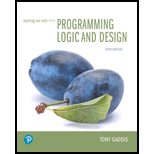
Concept explainers
Ackermann’s Function
7. Ackermann’s Function is a recursive mathematical
If m = 0 then return n + 1
If n = 0 then return ackermann(m – 1, 1)
Otherwise, return ackermann(m – 1, ackermann(m, n – 1))
Want to see the full answer?
Check out a sample textbook solution
Chapter 13 Solutions
Starting Out with Programming Logic and Design (5th Edition) (What's New in Computer Science)
Additional Engineering Textbook Solutions
Starting Out With Visual Basic (7th Edition)
Software Engineering (10th Edition)
Java How to Program, Early Objects (11th Edition) (Deitel: How to Program)
Web Development and Design Foundations with HTML5 (8th Edition)
Objects First with Java: A Practical Introduction Using BlueJ (6th Edition)
Starting Out with C++ from Control Structures to Objects (8th Edition)
- (Numerical) Write a program that tests the effectiveness of the rand() library function. Start by initializing 10 counters to 0, and then generate a large number of pseudorandom integers between 0 and 9. Each time a 0 occurs, increment the variable you have designated as the zero counter; when a 1 occurs, increment the counter variable that’s keeping count of the 1s that occur; and so on. Finally, display the number of 0s, 1s, 2s, and so on that occurred and the percentage of the time they occurred.arrow_forwardWrite the definition of a recursive function int simpleSqrt(int n) The function returns the integer square root of n, meaning the biggest integer whose square is less than or equal to n. You may assume that the function is always called with a nonnegative value for n. Use the following algorithm: If n is 0 then return 0. Otherwise, call the function recursively with n-1 as the argument to get a number t. Check whether or not t+1 squared is strictly greater than n. Based on that test, return the correct result. For example, a call to simpleSqrt(8) would recursively call simpleSqrt(7) and get back 2 as the answer. Then we would square (2+1) = 3 to get 9. Since 9 is bigger than 8, we know that 3 is too big, so return 2 in this case. On the other hand a call to simpleSqrt(9) would recursively call simpleSqrt(8) and get back 2 as the answer. Again we would square (2+1) = 3 to get back 9. So 3 is the correct return value in this case.arrow_forwardWrite a recursive function that returns the nth Fibonacci number from the Fibonacciseries.int fib(int n);arrow_forward
- Write recursive functions for the following equations:a. Harmonic number is defined by the equationb. Fibonacci numbers are defined by the formula:FN = FN-2 + FN-1, for N ≥ 2 with F0 = 0 and F1 = 1arrow_forward9. Ackermann's Function Ackermann's function is a recursive mathematical algorithm that can be used to test how well a computer performs recursion. Write a method ackermann (m, n), which solves Ackermann's function. Use the following logic in your method: If m = 0 then return n + 1 If n = 0 then return ackermann (m Otherwise, return ackermann(m 1, 1) 1, ackermann (m, n - 1))arrow_forwardConvert the following function into a recursive functionarrow_forward
- Ackermann’s function is a recursive mathematical algorithm that can be used to test how well a computer performs recursion. Write a function A(m, n) that solves Ackermann’s function. Use the following logic in your function: If m = 0 then return n + 1 If n = 0 then return A(m-1, 1) Otherwise, return A(m-1, A(m, n-1)) Test your function in a driver program that displays the following values:A(0, 0) A(0, 1) A(1, 1) A(1, 2) A(1, 3) A(2, 2) A(3, 2)arrow_forwardCodeW X b For func x C Solved X b Answer X https://codeworkou... CodeWorkout X270: Recursion Programming Exercise: Count Characters For function countChr() write the missing part of the recursive call. This function should return the number of times that the letter "A" appears in string "str". Recall that str.substring(a) will return the substring of str from position a to the end of str, while str.substring (a, b) will return the substring of str starting at position a and continuing to (but not including) the character at position b. Examples: countChr ("ctcoWCAt") -> 1 Your AnsSwer: 1 public int countChr(String str) { 2. if (str.length() return 0; } (0 4. { int count = 0; www. 5. 9. if (str.substring(0, 1).equals("A")) { count = 1 7. { 9. return count + > 1:10 AM 50°F Clear 12/4/2021 呼arrow_forwardIn the absence of a exit condition in a recursive function, the following error is givenarrow_forward
 C++ Programming: From Problem Analysis to Program...Computer ScienceISBN:9781337102087Author:D. S. MalikPublisher:Cengage Learning
C++ Programming: From Problem Analysis to Program...Computer ScienceISBN:9781337102087Author:D. S. MalikPublisher:Cengage Learning C++ for Engineers and ScientistsComputer ScienceISBN:9781133187844Author:Bronson, Gary J.Publisher:Course Technology PtrProgramming Logic & Design ComprehensiveComputer ScienceISBN:9781337669405Author:FARRELLPublisher:Cengage
C++ for Engineers and ScientistsComputer ScienceISBN:9781133187844Author:Bronson, Gary J.Publisher:Course Technology PtrProgramming Logic & Design ComprehensiveComputer ScienceISBN:9781337669405Author:FARRELLPublisher:Cengage


